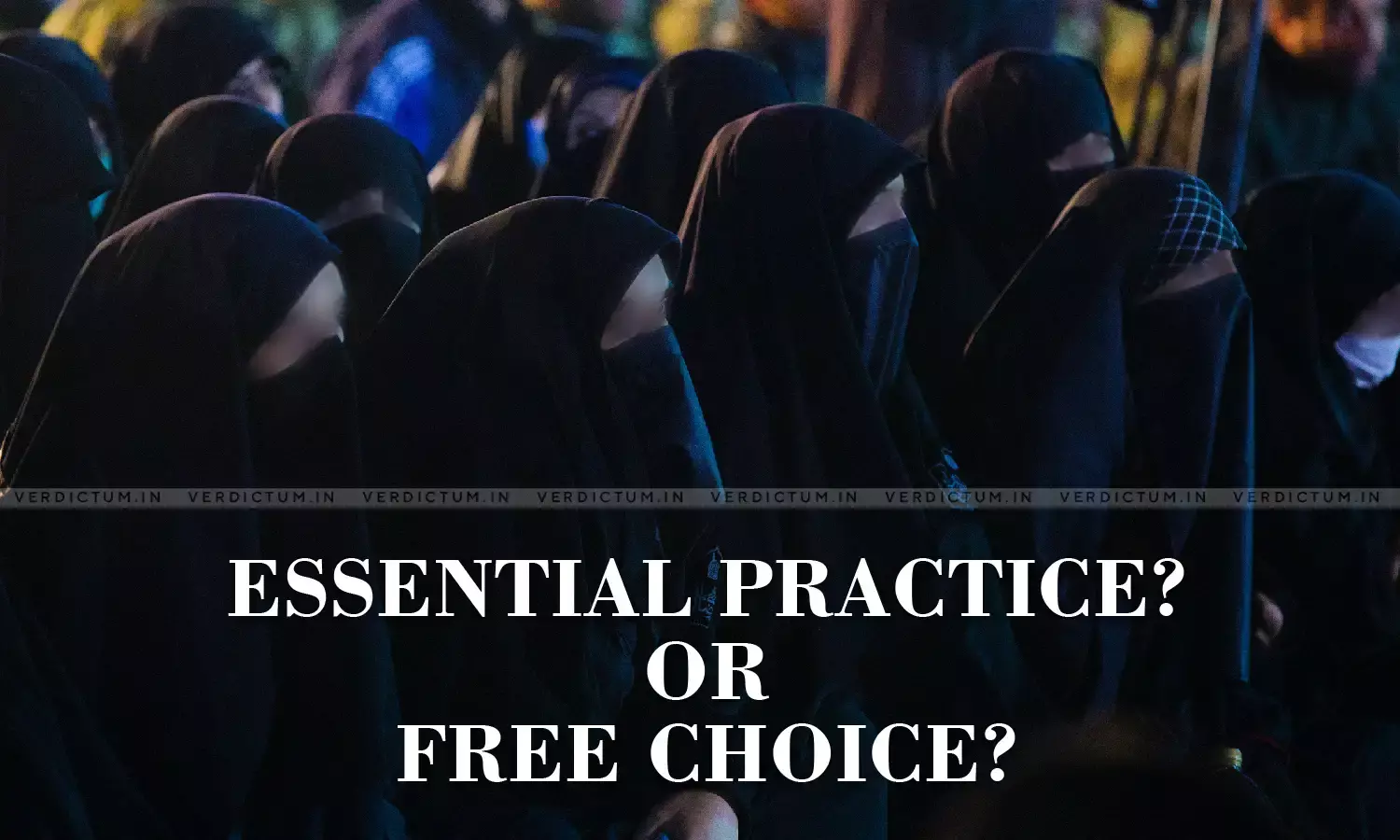Is Wearing Hijab An Essential Religious Practice Or A Choice?
There are two arguments in favour of hijab. One is that it is an essential religious practice and that the state could not regulate it in view of Article 25 of the Constitution. In the same breath, it is also contended that the state cannot interfere with one's choice of dress.
Therefore, wearing a hijab is one's choice (personal liberty) and thus a fundamental right to freedom of expression. To claim protection, they invoke Article 19(1)(a) and also Article 21. This article examines both these arguments and also the dichotomy when one invokes both these arguments at the same time.
What is essential religious practice?
Article 25 protects the freedom to practise rituals, ceremonies, etc. which are an integral part of a religion. In Commissioner of Police and others v. Acharya Jagadishwarananda Avadhuta (2004) 12 SCC 770, the Supreme Court laid down the test for determining whether a certain practice can be characterized as essential to a particular religion in order to guarantee protection under the Constitution?
The following observations are quite relevant to the issue at hand:
- Essential part of a religion means the core beliefs upon which the religion is founded. Essential practice means those practices that are fundamental to follow a religious belief. It is upon the cornerstone of essential parts or practices the superstructure of religion is built. Without which, a religion will be no religion.
- Test to determine whether a part or practice is essential to the religion is - to find out whether the nature of religion will be changed without that part or practice. If the taking away of that part or practice could result in a fundamental change in the character of that religion or in its belief, then such part could be treated as an essential or integral part.
- Nobody can say that essential part or practice of one's religion has changed from a particular date or by an event. Such alterable parts or practices are definitely not the 'core' of religion where the belief is based and religion is founded upon. It could only be treated as mere embellishments to the nonessential part or practices.
Hijab cannot pass the ERP test
So the following questions are required to be answered first if one wants to drive home the point that wearing of hijab is an Essential Religious Practice (ERP) as far as Islam religion is concerned:-
1. Is wearing of Hijab the foundation on which Islam is founded without which it will be no religion?
2. Whether the nature of Islam will change if women do not wear Hijab?
It is true that the Kerala High Court, in a judgment, after referring to various verses in Quran and Hadiths have held that the right of women to have the choice of dress based on religious injunctions is a fundamental right protected under Article 25(1), when such prescription of dress is an essential part of the religion.
According to the Court, covering the head and wearing a long sleeve dress by women have been treated as an essential part of the Islamic religion. With utmost respect, I would submit that the Court held thus without applying the tests of Essential Religion Practice.
The following are considered to be five pillars of Islam: The testimony that there is no deity but Allah and Muhammad (PBUH) is his bondman and apostle; and the observance of prayer, and the paying of the poor-due, and the pilgrimage to Mecca, and the fast of Ramadhan.
Irrespective of what dress a woman wears, no damage will happen to these five pillars on which Islam is based. Also if Muslim women do not wear hijab, the nature of Islam will not be changed. It will remain as it is. Viewed thus, hijab cannot pass the ERP test.
Much ado about Choice
There is no dispute with the proposition that a person has the fundamental right to freedom of expression regarding choice of dress and that personal liberty ought to be respected. But can a person enter a temple or a mosque in violation of the dress code imposed by them?
If it is one's choice to wear a dress, why should a person be not allowed to practice his fundamental right to worship in a religious place merely because he does not follow the dress code imposed by the management?
The same logic applies to educational institutions and at work places. Even lawyers have little choice in the matter of dress while they are in court. It is indeed a fundamental right to wear a dress one likes (even if it is a religious dress), but such right is subject to the dress codes and regulations in force in a particular place/institution.
Choice vs. ERP
Some Hijab advocates blow hot and cold while invoking both 'Choice' and 'ERP'. If something is an essential religious practice, it cannot be termed as a 'choice'. If a devout Muslim woman has a choice whether to wear a hijab or not, that means it is not essential to Islam. If a devout Muslim woman has to choose between practising Islam or wearing a dress of her choice, her wearing hijab cannot be called an exercise of free choice.
So, to conclude, in my view, Hijab is not an essential religious practice. Thus, state or educational institutions can regulate and impose dress codes by not allowing students to wear religious dress. The right to 'choice' of dress is contextual and the primacy must be given to regulations imposed in the place where the said right is sought to be exercised.
[The opinions expressed in this article are those of the author. Verdictum does not assume any responsibility or liability for the contents of the article.]












